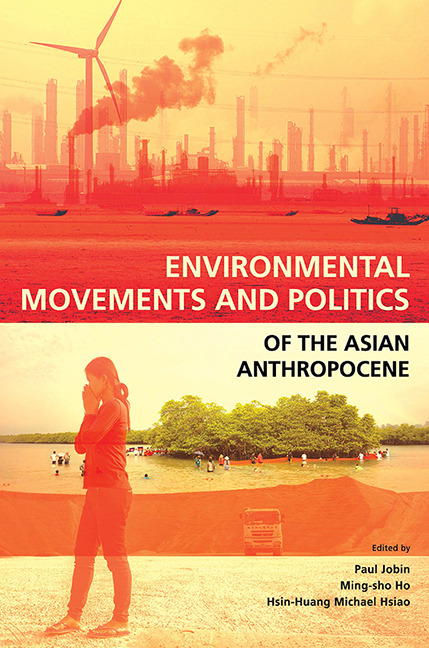Book contents
- Frontmatter
- Contents
- List of Tables, Maps and Figures
- Acknowledgements
- About the Contributors
- 1 Environmental Movements and Politics of the Asian Anthropocene: An Introduction
- 2 Environmental Movements in Taiwan’s Anthropocene: A Civic Eco-Nationalism
- 3 Environmental Movements in Post-handover Hong Kong: Between Managerialism and Radicalism
- 4 The Post-politics of Environmental Engagement in Singapore
- 5 Environmental Movements in the Philippines: Contestation for Justice in the Anthropocene
- 6 Environmental NGOs in “Post-New Order” Indonesia: Saving the Forests Through Democracy
- 7 Environmental Activism in Malaysia: Struggling for Justice from Indigenous Lands to Parliamentary Seats
- 8 State, NGOs, and Villagers: How the Thai Environmental Movement Fell Silent
- 9 Environmental Movements in Vietnam under One-Party Rule
- 10 The Cambodian Neopatrimonial State, Chinese Investments, and Anti-dam Movements
- 11 Conclusion: Environmental Movements and Political Regimes, or Why Democracy Still Matters in the Anthropocene
- Index
8 - State, NGOs, and Villagers: How the Thai Environmental Movement Fell Silent
Published online by Cambridge University Press: 08 October 2021
- Frontmatter
- Contents
- List of Tables, Maps and Figures
- Acknowledgements
- About the Contributors
- 1 Environmental Movements and Politics of the Asian Anthropocene: An Introduction
- 2 Environmental Movements in Taiwan’s Anthropocene: A Civic Eco-Nationalism
- 3 Environmental Movements in Post-handover Hong Kong: Between Managerialism and Radicalism
- 4 The Post-politics of Environmental Engagement in Singapore
- 5 Environmental Movements in the Philippines: Contestation for Justice in the Anthropocene
- 6 Environmental NGOs in “Post-New Order” Indonesia: Saving the Forests Through Democracy
- 7 Environmental Activism in Malaysia: Struggling for Justice from Indigenous Lands to Parliamentary Seats
- 8 State, NGOs, and Villagers: How the Thai Environmental Movement Fell Silent
- 9 Environmental Movements in Vietnam under One-Party Rule
- 10 The Cambodian Neopatrimonial State, Chinese Investments, and Anti-dam Movements
- 11 Conclusion: Environmental Movements and Political Regimes, or Why Democracy Still Matters in the Anthropocene
- Index
Summary
Environmental problems do not occur solely as a result of natural phenomena, but are also a product of multi-faceted socio-political interactions. This is especially true in the Anthropocene era, in which the impact of human activities on the environment has been elevated to a geological scale. Such interactions likewise effect the mobilization that arises in response to environmental problems. This chapter highlights how, in Thailand, the political changes of the last twenty years— including mass mobilizations, military coups, constitutional reforms, and erratic government—have reoriented the country's environmental movement(s) away from the activism of earlier years, toward a more reactionary stance. In Thailand, as in other countries of the region, environmental politics largely focuses on the over-exploitation of natural resources, such as rainforests for logging and agribusiness, and rivers for the construction of hydroelectric dams. Resource politics is especially important if we consider the new forms of governance and institution required to cope with the challenges of the Anthropocene.
Environmental politics in Thailand goes far beyond formal political institutions with the government at the centre. In fact, it involves the dynamism of power relations and the wider processes of democratization, the politics of mass mobilization, knowledge production, emerging economic and social aspirations, as well as the rise and decline of relations between incumbent governments and civil organizations. These relations may be embodied in different ways— contestation, negotiation, cooperation, even impasse. The changing interactions among actors also create a new terrain in which various kinds of political manoeuvres can be achieved in the area of resource politics and in environmentalism more broadly.
In this chapter, I look at Thailand's environmental movement during the past two decades through the interaction between the state, non-governmental organizations (NGOs), and the populations who are directly or indirectly affected by environmental issues. During the country's rapid economic growth in the 1990s, governments’ development policies often caused all sorts of ecological problems, resulting in the dissatisfaction and mobilization of people demanding better management. During the 2000s, the political instability of the country added to the obstruction of sustainable development, especially the lack of meaningful participation of average citizens in the decisionmaking process.
- Type
- Chapter
- Information
- Environmental Movements and Politics of the Asian Anthropocene , pp. 233 - 260Publisher: ISEAS–Yusof Ishak InstitutePrint publication year: 2021



